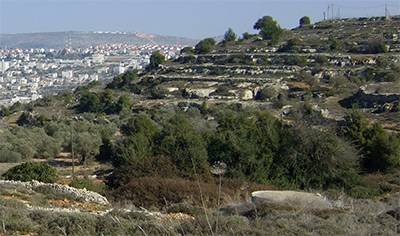
|
Farming in Israel and the Restoration of the Jews
Israel's Shmita. What it is and why it is significant.
|
|
Sunday, December 21, 2014
|
www.bibleinthenews.com Audio & Print versions
|
Hello. This is Nick Barnes, with this week’s Bible in the News.
We read in Exo 23:10-11
And six years thou shalt sow thy land, and shalt gather in the fruits thereof: But the seventh [year] thou shalt let it rest and lie still; that the poor of thy people may eat: and what they leave the beasts of the field shall eat. In like manner thou shalt deal with thy vineyard, [and] with thy oliveyard.
However, the Israelites were not always obedient to this commandment, as they were also guilty of adultery, murder, theft, idolatry and many other evils, and God warned them that such disobedience would lead to punishment and expulsion from God’s land. But in addition we read in Lev 26:31
31 And I will make your cities waste, and bring your sanctuaries unto desolation, and I will not smell the savour of your sweet odours. 32 And I will bring the land into desolation: and your enemies which dwell therein shall be astonished at it.
Not only were they to be removed from the land, the land itself was to be come waste and desolate; and its desolation was to be an astonishment to the nations that subsequently lived there.
God’s warning to Israel continues in v33
33 And I will scatter you among the heathen, and will draw out a sword after you: and your land shall be desolate, and your cities waste. 34 Then shall the land enjoy her sabbaths, as long as it lieth desolate, and ye [be] in your enemies' land; [even] then shall the land rest, and enjoy her sabbaths. 35 As long as it lieth desolate it shall rest; because it did not rest in your sabbaths, when ye dwelt upon it.
The prospect of the land of Israel becoming waste and desolate and that its fertile soil should lie fallow would have seemed incredible to the Israelite people. This was the land that flowed with milk and honey; an integral part of the ancient Fertile Crescent. Even today, the mountainous spine of the land is swathed in ancient terraces; evidence of a dense population and a fertility that extended well beyond the wide coastal plain into the rugged hills of Judea and Samaria.
And yet, in due course, the land did enjoy its sabbaths; for many, many centuries, the land was sparsely populated, unproductive and deforested. And their enemies which dwelt therein were indeed astonished at it. For example, Dio Cassius writing less than a century after the Jewish expulsion in 135, says
“Of their forts the fifty strongest were razed to the ground. Nine hundred and eighty-five of their best-known villages were destroyed... Thus the whole of Judea became desert, as indeed had been foretold to the Jews before the war. For the tomb of Solomon, whom these folk celebrate in their sacred rites, fell of its own accord into fragments, and wolves and hyenas, many in number, roamed howling through their cities
Leviticus had warned…
…your enemies which dwell therein shall be astonished at it.
…and indeed it is astonishing that the land should degenerate in this way. It was a vital land-bridge connecting Europe and Asia to Africa. It was crucial for the integrity of the Roman Empire that its armies could be marched through this thoroughfare – and since marching armies have to be fed, it was critical that the land should be populated and fruitful.
Yet down through the ages, of Romans, Byzantines, Arabs, Crusaders, Mamluks and Ottomans, writer after writer declares the poverty, the grime, and the barrenness of this previously beautiful land, and in later times there are many drawings, engravings and (from the 19th century) photographs of this unlovely scene.
One who visited the land in 1867, and who described his experience at length, was the novelist and journalist Mark Twain. Despite his witty and satirical style, the wasted and desolate condition of the land is clear, as can be best appreciated by reading the account in full. A link to the text is available at the bottom of this page[1].
Mark Twain tells us of the valley of Jezreel that…
There is not a solitary village throughout its whole extent-not for thirty miles in either direction. There are two or three small clusters of Bedouin tents, but not a single permanent habitation. One may ride ten miles hereabouts and not see ten human beings.
Mark Twain, The Innocents Abroad, pp. 349

Ancient terraces can be seen in Israel today from 3000 years ago.
He invites us to…
Come to Galilee... these unpeopled deserts, these rusty mounds of barrenness, that never, never do shake the glare from their harsh outlines, and fade and faint into vague perspective; that melancholy ruin of Capernaum: this stupid village of Tiberias, slumbering under its six funereal palms.... We reached Tabor safely .... We never saw a human being on the whole route.
Mark Twain, The Innocents Abroad, pp. 366, 375
At the end of his account of Palestine, he summarises as follows:
Palestine sits in sackcloth and ashes. Over it broods the spell of a curse that has withered its fields and fettered its energies… Nazareth is forlorn; about that ford of Jordan where the hosts of Israel entered the Promised Land with songs of rejoicing, one finds only a squalid camp of fantastic Bedouins of the desert; Jericho the accursed, lies a moldering ruin, to-day, even as Joshua's miracle left it more than three thousand years ago; Bethlehem and Bethany, in their poverty and their humiliation, have nothing about them now to remind one that they once knew the high honor of the Saviour's presence; the hallowed spot where the shepherds watched their flocks by night, and where the angels sang Peace on earth, good will to men, is untenanted by any living creature, and unblessed by any feature that is pleasant to the eye. Renowned Jerusalem itself, the stateliest name in history, has lost all its ancient grandeur, and is become a pauper village; the riches of Solomon are no longer there to compel the admiration of visiting Oriental queens; the wonderful temple which was the pride and the glory of Israel, is gone… The noted Sea of Galilee, where Roman fleets once rode at anchor and the disciples of the Saviour sailed in their ships, was long ago deserted by the devotees of war and commerce, and its borders are a silent wilderness; Capernaum is a shapeless ruin; Magdala is the home of beggared Arabs; Bethsaida and Chorazin have vanished from the earth, and the "desert places" round about them where thousands of men once listened to the Saviour's voice and ate the miraculous bread, sleep in the hush of a solitude that is inhabited only by birds of prey and skulking foxes.
And so the land enjoyed its sabbaths; so the land lay desolate and rested. Yet in Lev 26v44 God said
44 And yet for all that, when they be in the land of their enemies, I will not cast them away, neither will I abhor them, to destroy them utterly, and to break my covenant with them: for I [am] the LORD their God.
And in Eze 36 in which God tells us…
19 …I scattered them among the heathen, and they were dispersed through the countries: according to their way and according to their doings I judged them. ...
But God also promised, in Eze 36v24, …
24 …I will take you from among the heathen, and gather you out of all countries, and will bring you into your own land.
And the curse on the land was to last only as long as the Jews were exiled. Lev 26:34 says
…as long as it lieth desolate, and ye [be] in your enemies' land; [even] then shall the land rest, and enjoy her sabbaths.
And in v42 God says…
42 Then will I remember my covenant with Jacob, and also my covenant with Isaac, and also my covenant with Abraham will I remember; and I will remember the land.
And in v43
43 The land also shall be left of them, and shall enjoy her sabbaths, while she lieth desolate without them:
And 1882 marked the beginning of the First Aliyah – the first wave of Jews returning to the land. And as the Jews began to return to the land, so the land began to spring back into life.
And so the land is again a fruitful land, and in Eze 38 we find that in the “latter days” when the great northern invader descends on the “mountains of Israel”, in v12 we read, he comes…
12 To take a spoil, and to take a prey; to turn thine hand upon the desolate places [that are now] inhabited, and upon the people [that are] gathered out of the nations, which have gotten cattle and goods, that dwell in the midst of the land.
And today, the stage, as described by the prophet 2500 years ago, is set; the land, once “desolate”, is now “inhabited” again; the people, once scattered, are “gathered out of the nations” and “dwell in the midst of the land” – and they have “gotten cattle and goods”. It is no longer a waste; it is a fertile land with wealth “to take [as] a spoil”.
With the return of the Jew to the land, the land has become fruitful again. Even on satellite photographs the borders between Jew and Arab are clearly seen – because where the Jews are, the land if green.
The Bible revealed, thousands of years ago, that the Jews would be scattered from their land and then restored as a portent of the establishment of the kingdom of God on Earth. Their partial restoration was to be accompanied by a return of the land’s beauty and fertility.
And so as we see Jews restored to the land and the fruit of that land exported all over the world, we see clear evidence that the return of the Lord Jesus Christ is on the verge of becoming reality, when the restoration of both will be completed.
We read in Isa 35
1 The wilderness and the solitary place shall be glad for them; and the desert shall rejoice, and blossom as the rose. 2 It shall blossom abundantly, and rejoice even with joy and singing: the glory of Lebanon shall be given unto it, the excellency of Carmel and Sharon, they shall see the glory of the LORD, [and] the excellency of our God.
Soon Eden will be restored, and the Earth will be ruled in righteousness and filled with God’s glory. Until then we have opportunity to search God’s Word and watch for its fulfilment day by day.
This is Nick Barnes; see you again soon (God willing) for another edition of Bible in the News.
1. http://www.gutenberg.org/files/3176/3176-h/files/relative.htm#ch45